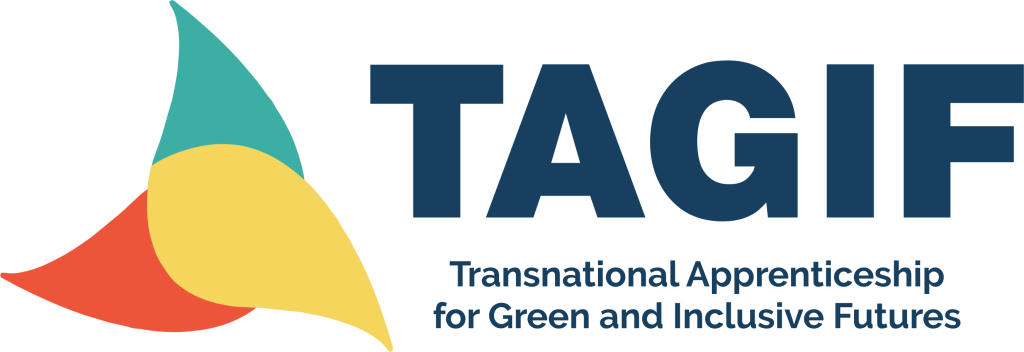
WELCOME
Transnational Master Class on Integrating Ecological, Digital, and Inclusion Transitions in the Engineering and Environmental Sectors
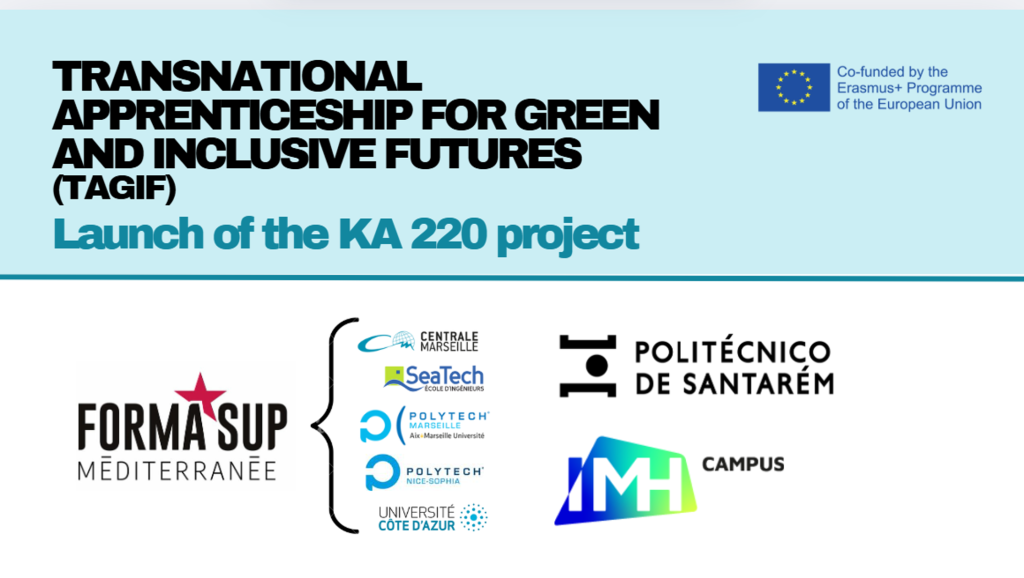
1. Presentation of TAGIF and partners
The project aims to transform European mobility into a major asset for businesses, enabling students and apprentices to become actors in transitions, by sharing business practices in the field of engineering and sustainable development, linked to the ecological and digital transition as well as inclusion.
It promotes transnational learning based on close cooperation between partners for the benefit of learners’ green skills.
The project adapts, designs and develops measurement, observation and sharing tools in terms of CSR impact and good business practices in engineering and ecology.
The creation of a hybrid transnational master class around digital and CSR transitions will prepare the use of the tools during mobility and may be extended by the implementation of Hybrid Intensive Programs.
The results and impact will be questioned, improved and disseminated throughout the project.
Partners : Formasup Méditerranée
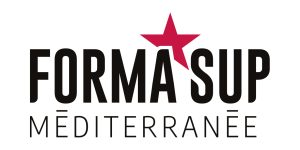
Formasup Méditerranée is an off-site apprentice training center (CFA) founded in 1993 in Marseille. It is the result of collaboration between the universities of the southern region (Aix-Marseille Université, Université Côte d’Azur, Université de Toulon, Avignon Université), partner public schools (such as Centrale Méditerranée, Sciences Po Aix, INSTN de Cadarache) and the professional branches of MEDEF Sud PACA.
This CFA manages the development of apprenticeships in higher education in the Provence-Alpes-Côte d’Azur region. Theoretical courses are taught directly in partner schools on the region’s various university sites. Formasup Méditerranée supports training managers, companies and work-study students throughout the work-study process.
With over 7,500 work-study students and 400 training courses, Formasup Méditerranée is the leader in the South of France and second in France. It offers a rich and diversified range of training programs. The main objective of Formasup Méditerranée is to promote and develop university-level work-study programs, harmonize the regional apprenticeship training offer, improve the professional integration of young people and promote international mobility.
Partners : IMH
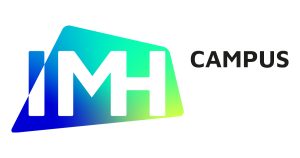
IMH Campus is an educational institution specializing in advanced and digital manufacturing. It operates within a network of strategic local and international partnerships and offers, on the one hand, high-value training for individuals through university education, vocational training and continuing education, and on the other hand, services for companies through technological and organizational innovation projects.
IMH Campus currently focuses on three strategic technological areas: Digital Manufacturing, Advanced Machining Manufacturing and Additive Manufacturing.
IMH Campus has a strong and natural relationship with industry. It has been a pioneer in DUAL training in Spain since 1996 and is a committed promoter of the Business–Education partnership, aiming to provide value to both students and companies, particularly in the field of Industry 4.0.
IMH Campus is composed of the IMH Integrated Vocational Training Center under the Department of Education of the Basque Government, and the Dual Engineering School of , which is attached to the University of the Basque Country (EHU).
IMH Campus is an integral part of the AFM Cluster and is recognized as an Agent of the Basque Science, Technology and Innovation Network.
Partners: IPSantarém

The Santarém Polytechnic University is a polytechnic public higher education institution, at the service of society, committed to the high level qualification of the citizens, destined to the production and diffusion of the knowledge, creation, transmission and diffusion of the knowledge of professional nature, Science, technology, the arts, guided research and experimental development, emphasizing centrality in the student and the surrounding community, within an international frame of reference.
It is recognized as a pole of development and a reference in training, culture and research developed in the region, created in the 70’s, currently comprises five High Schools, four in the city of Santarém and one in the city of Rio Maior.
2.Masterclass objectives
The transnational hybrid Masterclass, made possible through a close partnership between the teams and instructors of IMH, enables the construction of an inclusive program designed to better address the challenges of digital and ecological transitions, as well as inclusion.
Apprentices and students from Formasup Méditerranée, IMH, and IPS actively test and co-develop the tools created within the TAGIF project. In doing so, they prepare to use these tools during their international mobility to observe good professional practices related to ecological and digital transitions, and inclusion, throughout their internships abroad.
Their perspectives contribute to the development of tools that are as relevant and practical as possible—closely aligned with their realities and those of businesses—ensuring usability and impact.
The Masterclass offers a variety of pedagogical approaches to enhance learning and ownership.
It emphasizes experiential learning, co-construction, group work, and creativity.
3.Planning of the Week
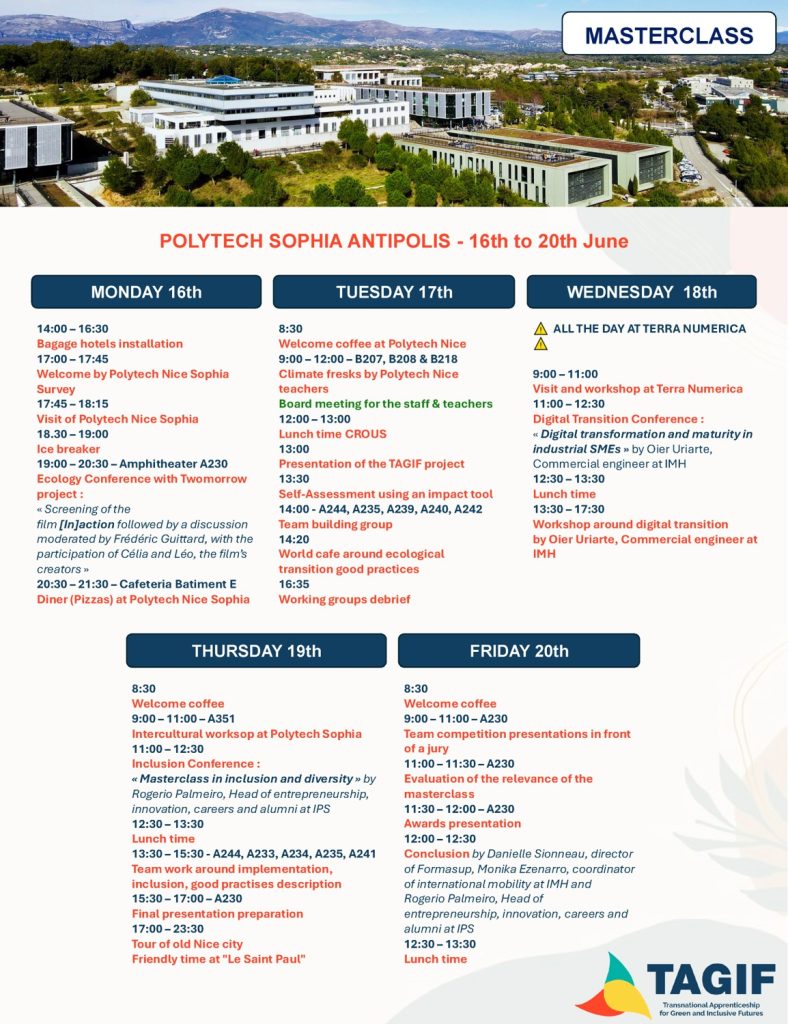
4. Speakers introduction
Ecological conference

👤 : Frédéric GUITTARD, Training Manager
IMREDD – University of Côte d’Azur – France
🔗 LinkedIn Profile : www.linkedin.com/in/fr%C3%A9d%C3%A9ric-guittard-656601/
🎤 Presentation Topic:
“(IN)ACTION movie”
Digital Conference
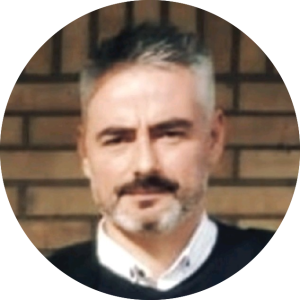
👤 : Oier URIARTE GIL, Commercial Engineer
IMH Campus (Machine Tool Institute) – Spain
Commercial Engineer with strong experience in business–training partnerships and acquisition of
innovation projects in advanced manufacturing, additive manufacturing, and digital factory.
Actively involved in the European project AIRINVET, which aims to align vocational education and training
(VET) with the key skills needed across all industrial sectors. Promoter of strategic collaborations to
attract and develop technical talent.
🔗 LinkedIn Profile : linkedin.com/in/oier-uriarte-gil-401b9272
🎤 Presentation Topic:
“Digital transformation and maturity in industrial SMEs”
📘 Summary of Content
This report offers a comprehensive and didactic guide on digital transformation and technological maturity in industrial SMEs, covering everything from basic concepts to advanced strategies. It explores the evolution toward Industry 4.0, digital maturity assessment methodologies, leadership models, organizational culture, technological infrastructure, industrial connectivity, data analysis, automation, real-life case studies, and practical learning tools for students.
🎯 Objectives
- Understand what digital maturity is and how it applies to industrial SMEs.
- Explore key technologies of Industry 4.0 and their integration into production processes.
- Identify assessment methodologies and practical tools for digital diagnostics.
- Develop strategic and cultural capabilities required for sustainable digital transformation.
- Analyze real case studies bridge theory and practice.
- Promote active learning through exercises, workshops, simulations, and self-assessments.
Link or QR Code to additional resources :
https://www3.weforum.org/docs/WEF_Digital_Transformation_for_SMEs_2024.pdf?utm_source=chatgpt.com
Inclusion Conference
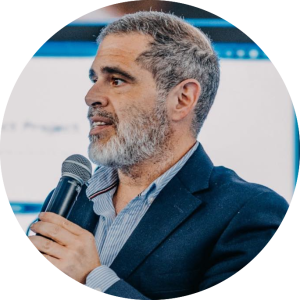
👤 : Rogerio PALMEIRO, Head of entrepreneurship, innovation, careers and alumnis
Instituto Politécnico de Santarém – Portugal
Rogério Emanuel Palmeiro has over 25 years of experience in the area of business and industry relations. In recent years, he has established several synergies and connections between local stakeholders, such as city councils, the economic, productive and industrial sector and knowledge dissemination institutions, such as universities. The themes focused on social innovation, impact entrepreneurship and social incubators are central themes of his work.
🔗 LinkedIn Profile : https://www.linkedin.com/in/rog%C3%A9rio-palmeiro-35ba82272/
🎤 Presentation Topic:
“Masterclass in inclusion and diversity”
5. Overview of activities
Climate Fresks

Title of the Activity:
Climate fresk
Facilitator(s):
Maxime BOURDILLON, Amélie BOURGEOIS, Stefania DANTE, Michaël RUFF
Duration:
3h
Format:
collaborative workshops of 8 participants each
Objectives:
- Objective 1 : learn the fundamental science behind climate change (based on IPCC reports)
- Objective 2 : climate fresk will empower you to the action !
- Objective 3 : have a good time together !
Description:
In order to take action and build solutions, we first need to understand the problem. Climate Fresk is a powerful tool for providing a quality climate education. It is accessible to anyone, neutral and objective and presents only established scientific facts.
By activating the collective intelligence of the group (8 participants), the workshops enable participants to take ownership of the subject matter.
They will take an active role in the building-up of the Fresk, becoming participative learners.
Expected Outcomes:
- Participants leave the workshop having formed a strong bond with each other, and are well equipped to implement the climate actions that they have identified
Ecological transition good practices observation grid team activity

Facilitator(s):
Jade Peyre,Hugo Larroque,Mohamed Didi,Marina Fructus
Duration:
3 heures
Format:
World café
Objectives:
- Objective 1 Explore the key themes of the ecological transition and the Sustainable Development Goals (SDGs) linked to each of them
- Objective 2 Identify good practices implemented in each of these fields, whether in your workplace or daily routine.
- Objective 3 Take part in developing the observation grid of good practices to be used during the mobility programme.
Description:
Work in sub-groups of 5 to 6 participants with the aim of sharing positive actions related to ecological transition implemented in companies, and exchanging on good practices that could be applied in daily life. The World Café format allows participants to enrich each other’s ideas and to gain ownership of each of the themes related to the ecological transition.
Expected Outcomes:
- Participants will be equipped to identify and apply concrete examples of actions, behaviors, and best practices addressing the challenges of the ecological transition
- Participants contribute to the creation of an observation grid that they will be able to easily use in their companies and during their mobility experience.”
Terra Numerica
Title: Explore, play, and learn: digital sciences come alive through the lens of research!”
Facilitators:
Jérémy Camponovo
Terra Numerica mediator
PhD in biomedicine-oriented nanoarchitecture
High School Computer science Teacher in preparatory classes in computer physics math at the Centre International de Valbonne.
Nicolas Nisse
Terra Numerica mediator
Research Director at “Inria Centre at the Université Côte d’Azur”.
Engineer from the French Engineering School, Supélec”, and Doctor of Computer Science from “Université Paris-Sud”.
His research interests include graph theory, graph algorithms and combinatorial optimisation and problems in networks.
Duration: 2 hours
Format: Group activity
Objectif 1: Raise awareness of the fundamental concepts and current challenges of digital technology, including artificial intelligence.
Objective 2: Support (encourage/foster..) participants in developing a scientific mindset and understanding the real-life uses of digital technologies.
Objective 3: Develop skills related to algorithms, mathematical modelling, machine learning and network optimisation.
Description:
These activities will offer an immersion into the world of algorithms, in particular two that form the basis of artificial intelligence today. Participants will discover how machines can learn and make decisions through various interactive workshops. Participants will discover how machines can learn and make decisions through various interactive workshops. They will also explore the differences between classical algorithms and those based on machine learning, while experimenting and playing with wooden machines, inverted pendulums and sorting networks.
The concepts of mechanics, physics, and network optimisation will also be covered, allowing participants to understand the impact of changes on energy consumption.
Expected results:
Participants will be able to visualise different types of algorithms, their applications, and their current challenges. They will acquire knowledge about how machine learning works, algorithmic validity, and network optimisation. They will practise and reflect on the cross-disciplinary nature of digital sciences by making connections between algorithms, networks, energy, physics, mechanics, and robotics.
Digital transition observation grid workshop
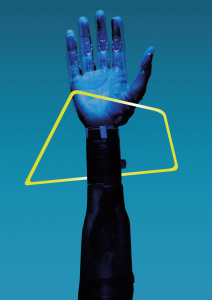
Title of the Activity:
Digital Maturity Workshop: Creating Grids for a Smarter Tomorrow
Facilitator(s):
Oier Uriarte, Iker Altuna, Monika Ezenarro – IMH Campus
Duration:
2h30
Format:
Workshop
Objectives:
- Apply critical thinking and analytical skills to assess digital maturity in real or simulated business contexts, integrating theoretical knowledge into practical evaluation.
- Foster teamwork, effective communication, and collective reflection, encouraging participants to exchange perspectives on digital challenges and opportunities across sectors.
- Develop practical problem-solving and strategic design competencies through the co-creation of digitalization grids tailored to different sectoral and organizational contexts.
Description:
This practical workshop enables students to apply theory to practice by evaluating the digital maturity of a company using the “6 axes” analysis framework. First, participants will conduct an individual diagnosis, then work in sector-based groups (industry, inclusion, ecological transition) to co-create sectoral digitalization grids. The session culminates in the collaborative construction of a general digitalization matrix that integrates the different sectoral perspectives. Activities include guided reflection, group work, and collaborative design using both analog and digital tools.
Expected Outcomes:
- Participants will be able to assess digital maturity using a structured, multi-dimensional framework.
- They will become familiar with key digital challenges in different sectors and some strategies to address them.
- They will collaborate to create practical digitalization grids that can be adapted to various contexts and industries.
Intercultural Workshop

Title of the Activity:
Cross-Cultural Communication Workshop
Facilitator(s):
Julie MAIFFRET, Polytech Nice Sophia
Lisa TAVERNA, Polytech Nice sophia
Chloé TOVAR, Polytech Nice Sophia
Duration: 2h00
Format: Workshop
Objectives:
- Objective 1 : Develop intercultural awareness
- Objective 2 : Improve intercultural communication skills
- Objective 3 : Strengthen the ability to work effectively across cultures
- Objective 4 : Prepare students for study abroad programs or international careers.
Description:
WORLD MAP: Participants will imagine a world map on the floor. We’ll ask them questions, and they will simultaneously move around this imaginary map based on their answers. The questions could relate to their mobility experiences (past or future), cultural understanding, or even stereotypes about different countries. After each question, we will ask participants why they chose that particular country and briefly debrief with them.
THEATRE GAME: Participants will be divided into small groups (for exemple, four students per group). Two of them will face a challenging situation and must explain the problem to the other two, who will offer advice on how to resolve it. However, they won’t be allowed to use a language they all understand—they can use a foreign language, invent one, or rely on gestures. We will prepare scenarios in advance, focusing on everyday situations, mobility experiences, workplace interactions, and more. This game will help us explore communication (verbal and non-verbal), conflict resolution, inclusion, and cultural differences.
Expected Outcomes:
- By physically placing themselves on the “map,” participants visualize global diversity and examine how they relate to different regions or cultures.
- Participants practice expressing their views and explaining the reasoning behind their choices, fostering intercultural dialogue.
- Participants learn to rely on gestures, tone, and creativity to convey meaning without a shared language.
- By simulating intercultural misunderstandings or dilemmas, participants explore inclusive and respectful ways to resolve tension.
- Working in small, creative teams fosters collaboration and mutual support among participants from diverse backgrounds.
Inclusion good practises Observation Grid team activity
Facilitator(s):
Jade Peyre Hugo Larroque Julie Delaby Marina Fructus
Duration:
2 heures
Format:
Team work
Objectives:
- Objective 1 Gain a deeper understanding and ownership of inclusion-related themes.
- Objective 2 Provide a detailed description of good practices observed in the field of inclusion
Description:
In 7 sub-groups, participants work on a theme related to inclusion and provide a detailed description of around ten actions they have observed being implemented in companies
Expected Outcomes:
- Participants will feel more confident in observing good practices, identifying the conditions for success, analyzing the behaviors involved, and describing them in detail to facilitate sharing and replication.
- They contribute to the development of the observation grid that they will use during their mobility experience.
6. Introduction of the Participants
Formasup Méditerranée team during Masterclass

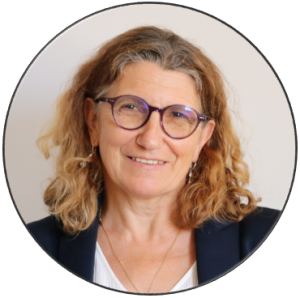
Danielle SIONNEAU
Directrice de Formasup Méditerranée
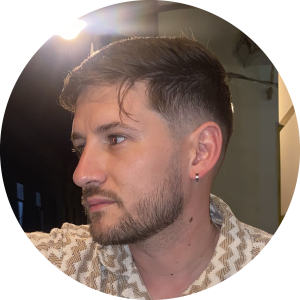
Hugo LARROQUE
Responsable du service
Relations Internationales

Marina FRUCTUS
Innovation et gestion de projet relations internationales
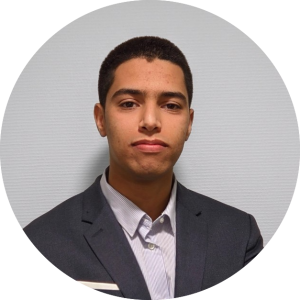
Mohammed DIDI
Ingénieur de recherche Polyaéro
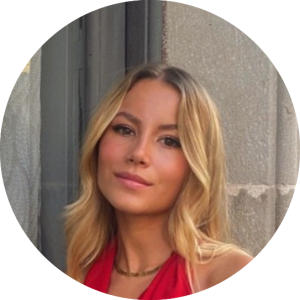
Jade PEYRE
Ingénieure qualité et RSE
IMREDD Université de Côte d'Azur
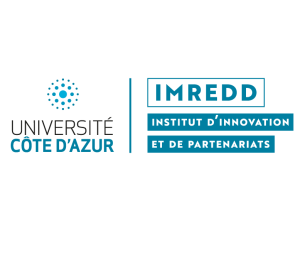
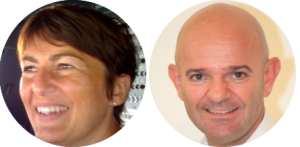
Master’s Degree in Science and Materials Engineering
N.I.C.E. Track – Nanomaterials, Industry & Management, Conception & Quality, Energy & Environment
“Training future project managers in the field of innovative materials and management.”
This Master’s program addresses the new international challenges in the fields of energy and the environment through the design and understanding of innovative materials.
This two-year professional Master’s degree prepares students for careers as engineers and project managers, equipping them with strong skills in material sciences, project management, and regulatory frameworks—key assets for future leaders.
Courses are delivered throughout the academic year (from September to June) using innovative teaching methods, including interactive learning, flipped classrooms, blended learning (in-person and online), and MOOCs. Each course module is assessed through continuous evaluation.
Ingénieurs Polytech Marseille Spécialité Mécanique et Energétique

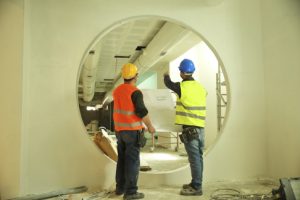
Polytech Marseille’s “Mechanics and Energy” specialization trains engineers to design, model and control processes in the fields of energy, heat transfer and fluid mechanics.
Students acquire solid skills in : renewable and fossil energies, heat and mass transfer , thermal and fluid mechanics, modeling and numerical simulation and energy utilization and combustion
They are trained to design and develop products or services linked to energy production or transfer, manage projects, diagnose and maintain energy systems.
Graduates can work in a variety of industrial sectors, such as : energy production and distribution, mechanical and thermal industries, engineering and design offices, maintenance and operation of energy systems. They can work as design engineers, production engineers, project managers or energy consultants.
IMH Campus (Machine Tool Institute)

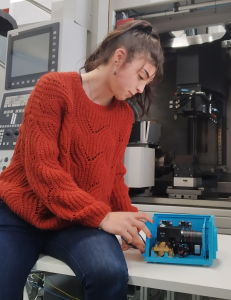
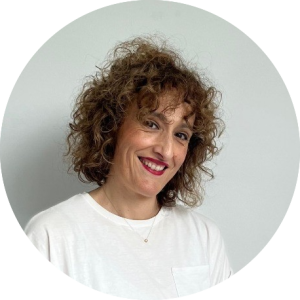
Monika EZENARRO
Coordinator of International Mobility, Academic Tutoring, Quality, Assurance
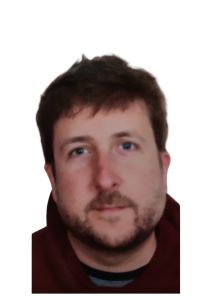
Iker ALTUNA
Head of the Manufacturing Department

Oier URIARTE
Commercial Engineer
IMH Campus Bachelor’s Degree in “Processes and Product Innovation Engineering
The Bachelor’s Degree in “Processes and Product Innovation Engineering” at IMH Campus (attached to the University of the Basque Country – EHU) trains engineers capable of designing, improving, and managing industrial products and processes through technological innovation, automation, and advanced manufacturing.
Students acquire solid skills in product and process design, industrial automation and control, advanced manufacturing, innovation management, sustainable production, and digital transformation for Industry 4.0.
A key feature of this program is its dual education model, where students combine academic studies with internships in partner companies. This approach allows them to apply theoretical knowledge in real industrial environments, gaining valuable professional experience before graduation.
Graduates are prepared to lead innovation and industrial improvement projects, develop and implement new technologies, manage product lifecycles and production systems, and integrate digital tools in manufacturing processes.
They can work across diverse sectors such as automotive, machine tool, advanced manufacturing, product engineering, renewable energy, and industrial consultancy. Typical roles include product design engineer, process improvement specialist, project manager, and innovation consultant.
Instituto Politécnico de Santarém


Rogério PALMEIRO
Head of entrepreneurship, innovation, careers and alumnis
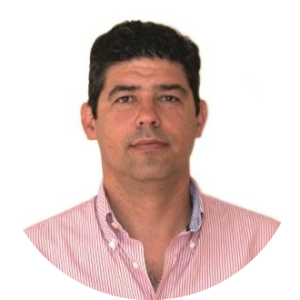
José Manuel CARVALHO
Teacher

Isabel Piscalho
Teacher
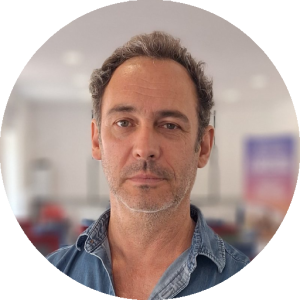
Fernando Veloso
Head of Marketing and Communications
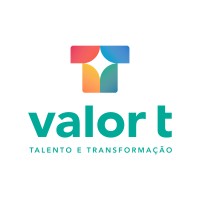
Students:
Ambiental Education
4 Portuguese Students
4 Management and Administration Erasmus Students
Poland 🇵🇱
Bulgaria 🇧🇬
Slovenia 🇸🇮
7. Reception Places

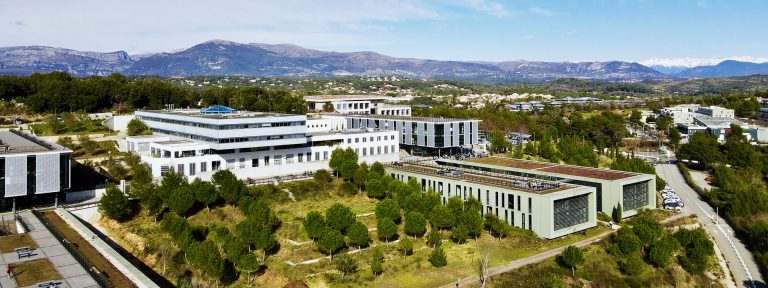
Polytech Nice Sophia is the polytechnic engineering school of Université Côte d’Azur, in the South of France. It is a public school of the Ministry of Higher Education, Research and Innovation. It is part of the group of state polytechnic engineering schools within the POLYTECH network. It is accredited by the Commission des titres d’ingénieur (CTI) and certified ISO9001 v2015 by the Bureau Veritas, and is at the center of a synergy between education, research and business. It is located on the SophiaTech campus in the heart of the Sophia-Antipolis technology park.
With post-baccalaureate, Polytech Nice Sophia offers a preparatory cycle and 8 engineering courses with a solid scientific and technical base, possessing an excellent business culture and initiated to management functions. The fields covered are Buildings, Electronics, Electronics and Industrial Computing, Biology Engineering, Water Engineering, Applied Mathematics and Modeling, Robotics and Computer Sciences.
Member of the network of polytechnic engineering schools of universities
Polytech Nice Sophia is part of the Polytech network, which brings together public university engineering schools under the Ministry of Higher Education, Research and Innovation. These schools award engineering degrees accredited by the Commission des Titres d’Ingénieur (CTI).
With a broad range of scientific disciplines, a strong alumni community, and a significant number of graduates each year, the Polytech network forms one of the major engineering training networks in France.
The close connection to high-level academic research — supported by numerous teacher-researchers — and the active participation of professionals from various sectors offer students solid preparation to meet today’s and tomorrow’s engineering challenges.


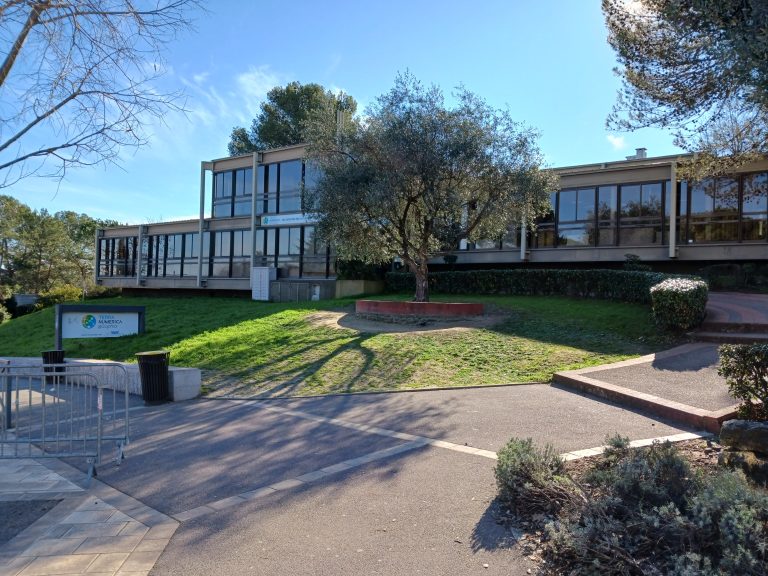
Polytech Nice Sophia is the polytechnic engineering school of Université Côte d’Azur, in the South of France. It is a public school of the Ministry of Higher Education, Research and Innovation. It is part of the group of state polytechnic engineering schools within the POLYTECH network. It is accredited by the Commission des titres d’ingénieur (CTI) and certified ISO9001 v2015 by the Bureau Veritas, and is at the center of a synergy between education, research and business. It is located on the SophiaTech campus in the heart of the Sophia-Antipolis technology park.
With post-baccalaureate, Polytech Nice Sophia offers a preparatory cycle and 8 engineering courses with a solid scientific and technical base, possessing an excellent business culture and initiated to management functions. The fields covered are Buildings, Electronics, Electronics and Industrial Computing, Biology Engineering, Water Engineering, Applied Mathematics and Modeling, Robotics and Computer Sciences.
Member of the network of polytechnic engineering schools of universities
Polytech Nice Sophia is part of the Polytech network, which brings together public university engineering schools under the Ministry of Higher Education, Research and Innovation. These schools award engineering degrees accredited by the Commission des Titres d’Ingénieur (CTI).
With a broad range of scientific disciplines, a strong alumni community, and a significant number of graduates each year, the Polytech network forms one of the major engineering training networks in France.
The close connection to high-level academic research — supported by numerous teacher-researchers — and the active participation of professionals from various sectors offer students solid preparation to meet today’s and tomorrow’s engineering challenges.
8. Pratical Informations
HOTELS
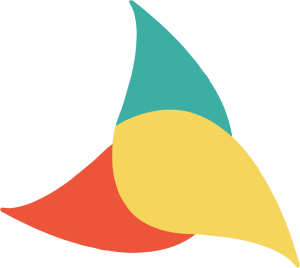
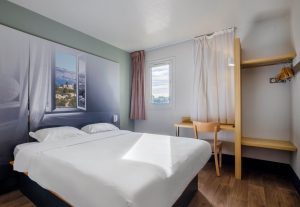


BUS

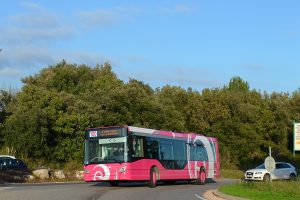
Bus from Antibes train station to Polytech Nice Sophia - Polytech MRS promotion

Bus from Nice airport to Polytech Nice Sophia
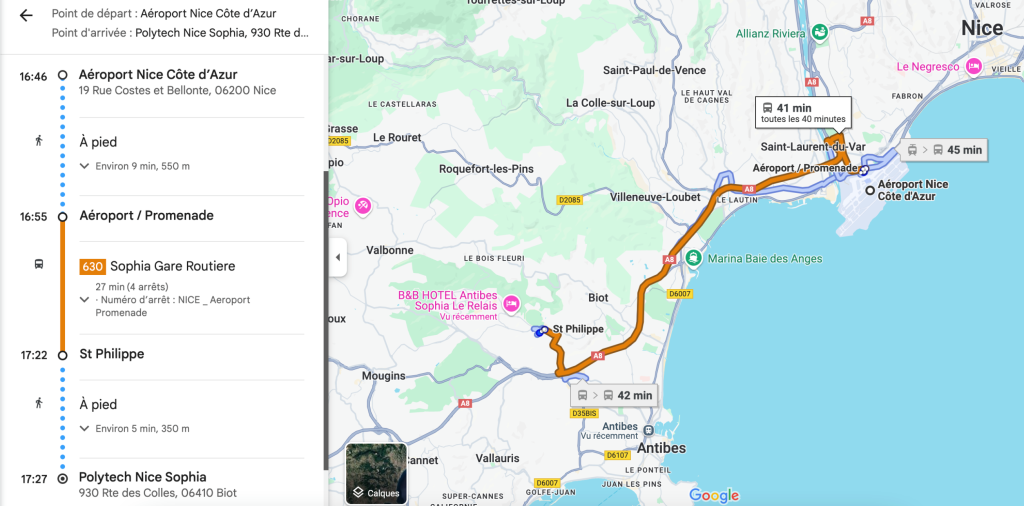
Bus between Polytech Nice Sophia and Antibes
Careful ! Last departure from Antibes at 9:23 p.m.
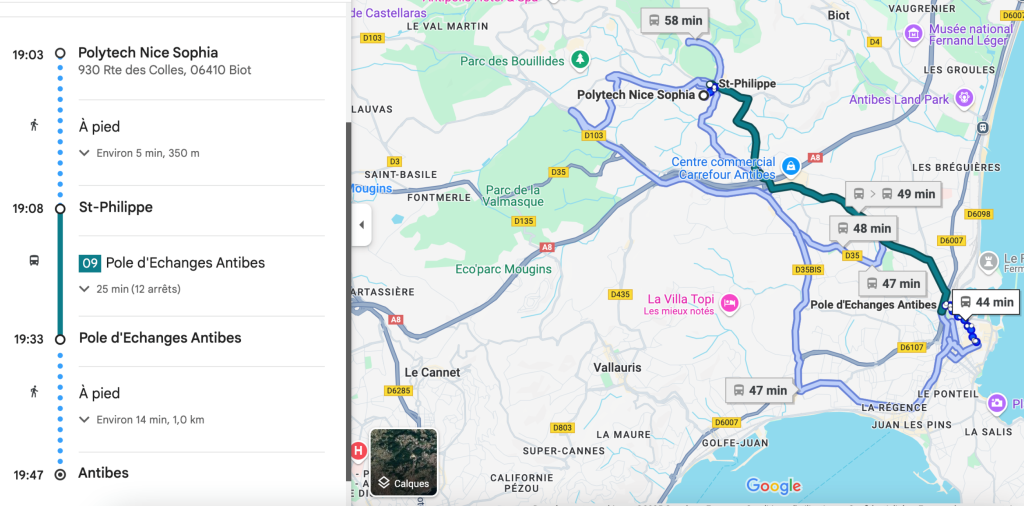
Bus between hotels and Terra Numerica on Wednesday, June 18
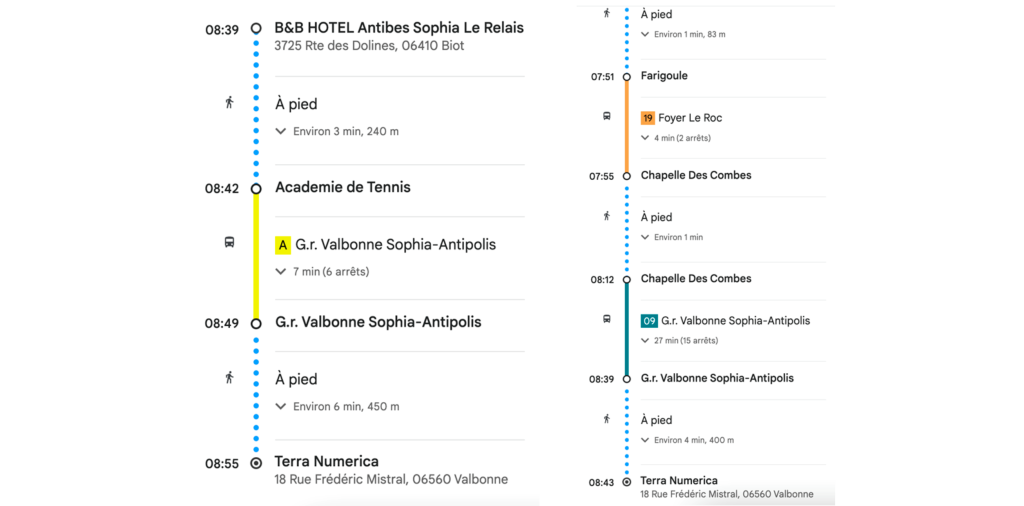
Bus from B&B Le Relais to Polytech Nice Sophia

Bus from Ibis Budget hotel to Polytech Nice Sophia
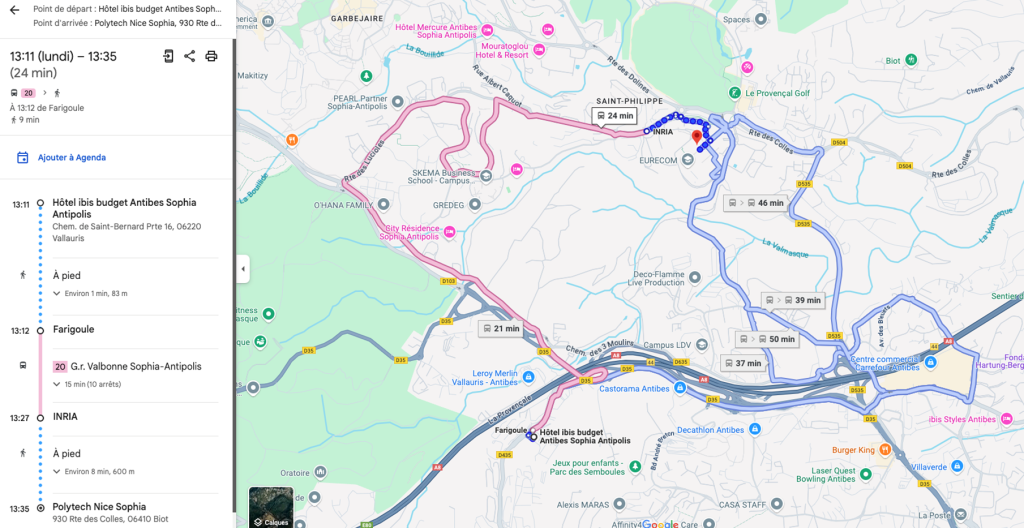
TAGIF Group WhatsApp
